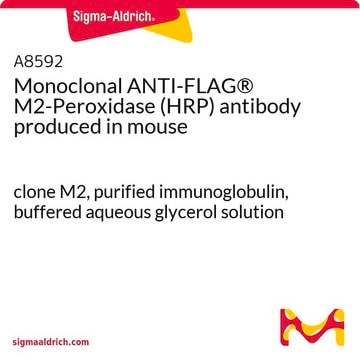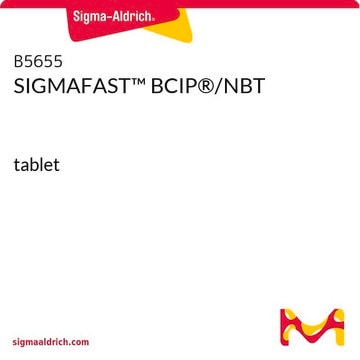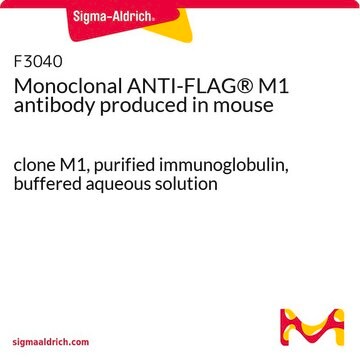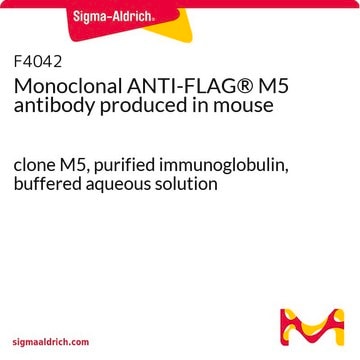A9469
Monoklonale ANTI-FLAG® M2-Alkalische Phosphatase in Maus hergestellte Antikörper
clone M2, purified immunoglobulin, buffered aqueous glycerol solution
Synonym(e):
Monoklonaler ANTI-FLAG® M2-Antikörper in Maus hergestellte Antikörper, Anti-ddddk, Anti-dykddddk
About This Item
Empfohlene Produkte
Biologische Quelle
mouse
Konjugat
alkaline phosphatase conjugate
Antikörperform
purified immunoglobulin
Antikörper-Produkttyp
primary antibodies
Klon
M2, monoclonal
Form
buffered aqueous glycerol solution
Speziesreaktivität
all
Konzentration
~1 mg/mL
Methode(n)
indirect ELISA: 1:20,000
Isotyp
IgG1
Immunogene Sequenz
DYKDDDDK
Versandbedingung
wet ice
Lagertemp.
−20°C
Angaben zum Gen
human ... ALPL(249)
Suchen Sie nach ähnlichen Produkten? Aufrufen Leitfaden zum Produktvergleich
Allgemeine Beschreibung
Anwendung
Western Blot (1 Publikation)
- in direkten Gewebe-Blot-Immunassays von Proben aus den Blattstielen von Süßorangen
- beim Screening der Internalisierung von delta-Opioidrezeptoren
- für ein Screening auf zellfreie Proteinexpression mittels ELISA
Physikalische Form
Rechtliche Hinweise
Not finding the right product?
Try our Produkt-Auswahlhilfe.
Lagerklassenschlüssel
10 - Combustible liquids
WGK
WGK 3
Flammpunkt (°F)
Not applicable
Flammpunkt (°C)
Not applicable
Analysenzertifikate (COA)
Suchen Sie nach Analysenzertifikate (COA), indem Sie die Lot-/Chargennummer des Produkts eingeben. Lot- und Chargennummern sind auf dem Produktetikett hinter den Wörtern ‘Lot’ oder ‘Batch’ (Lot oder Charge) zu finden.
Besitzen Sie dieses Produkt bereits?
In der Dokumentenbibliothek finden Sie die Dokumentation zu den Produkten, die Sie kürzlich erworben haben.
Kunden haben sich ebenfalls angesehen
Unser Team von Wissenschaftlern verfügt über Erfahrung in allen Forschungsbereichen einschließlich Life Science, Materialwissenschaften, chemischer Synthese, Chromatographie, Analytik und vielen mehr..
Setzen Sie sich mit dem technischen Dienst in Verbindung.

















